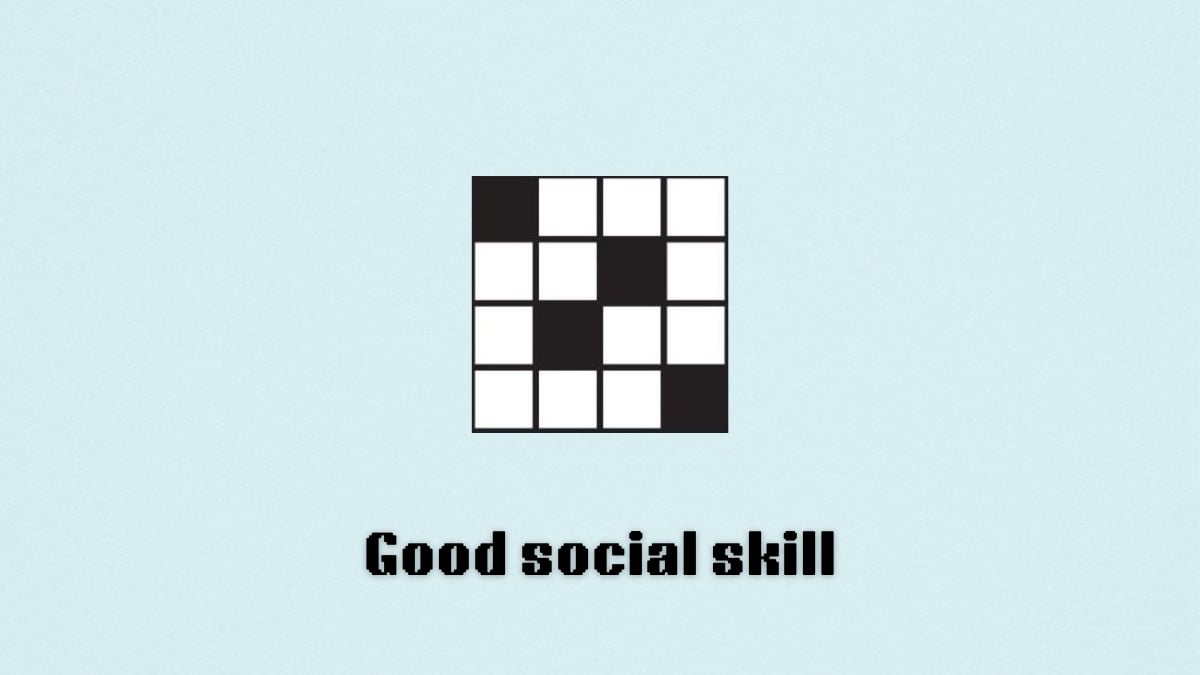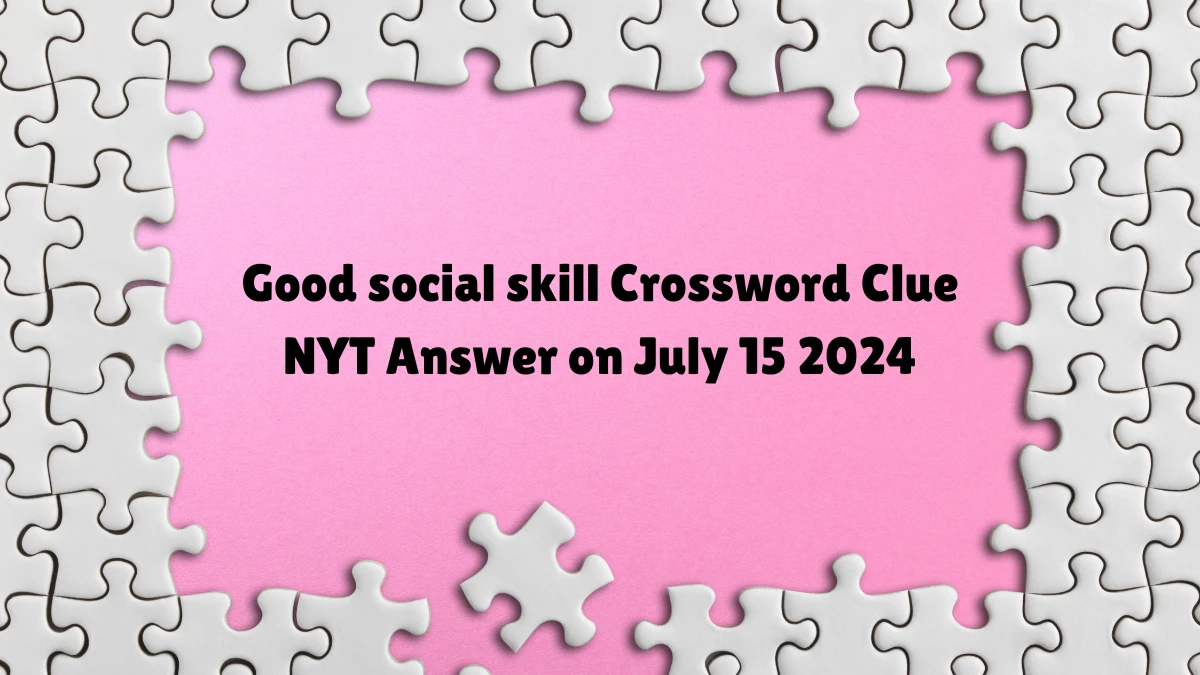Mastering Good Social Skills: The NYT Crossword Clue To Building Stronger Connections
Mar 22 2025
Good social skills are an essential part of human interaction that can significantly impact both personal and professional success. Whether it's solving the "good social skills" clue in the NYT crossword or improving your real-life interactions, understanding the nuances of effective communication is crucial. This article dives deep into the importance of social skills, how they relate to the crossword puzzle, and how you can develop them to enhance your life.
In today's fast-paced world, where digital communication often overshadows face-to-face interactions, having strong social skills is more important than ever. These skills are not just about being friendly or outgoing; they involve active listening, empathy, and the ability to navigate complex social situations with ease.
For those who enjoy solving puzzles, the "good social skills" clue in the NYT crossword offers a fascinating glimpse into how language and social behavior intersect. By understanding the concept behind this clue, we can better appreciate the value of social intelligence in our daily lives.
Read also:Woodstone Danielsville Pa Your Ultimate Guide To A Luxurious Getaway
Table of Contents
- What Are Good Social Skills?
- NYT Crossword Clue: "Good Social Skills"
- The Importance of Social Skills in Everyday Life
- Benefits of Developing Strong Social Skills
- How to Develop Good Social Skills
- Common Barriers to Developing Social Skills
- Practical Tips for Improving Social Skills
- Social Skills in Professional Settings
- Measuring Success in Social Interactions
- Conclusion: Unlock Your Potential
What Are Good Social Skills?
Good social skills refer to the ability to communicate effectively, build relationships, and navigate social situations with confidence. These skills encompass verbal and non-verbal communication, active listening, empathy, and emotional intelligence. People with strong social skills are often seen as approachable, trustworthy, and capable of resolving conflicts amicably.
According to a study published in the Journal of Personality and Social Psychology, individuals with high social intelligence tend to experience greater success in both personal and professional domains. This is because they can read social cues, adapt to different environments, and build meaningful connections with others.
NYT Crossword Clue: "Good Social Skills"
The New York Times crossword puzzle often includes clues that challenge solvers to think critically about language and its nuances. The "good social skills" clue is a perfect example of this. While the answer might vary depending on the context, common solutions include "ETIQUETTE" or "MANNERS." These words encapsulate the essence of effective social interaction.
Why Does the NYT Crossword Focus on Social Skills?
The NYT crossword frequently incorporates themes related to human behavior and communication because these topics resonate with a broad audience. By including clues like "good social skills," the puzzle encourages solvers to reflect on their own social abilities and the importance of interpersonal communication.
The Importance of Social Skills in Everyday Life
Social skills play a vital role in shaping our interactions with others. They influence how we form relationships, resolve conflicts, and express ourselves. In a world where collaboration and teamwork are increasingly valued, having strong social skills is essential for success.
- Personal Relationships: Good social skills help foster deeper connections with family, friends, and romantic partners.
- Professional Growth: Employers often prioritize candidates with strong communication and interpersonal skills.
- Conflict Resolution: Socially intelligent individuals are better equipped to handle disagreements and find mutually beneficial solutions.
Benefits of Developing Strong Social Skills
Developing strong social skills offers numerous advantages that can enhance various aspects of your life:
Read also:Exploring The Vibrant World Of Espacio Discoteque
1. Improved Communication: Effective communication is the foundation of all successful relationships. By honing your social skills, you can express yourself more clearly and understand others better.
2. Increased Confidence: People with good social skills tend to feel more self-assured in social settings, which can lead to greater personal satisfaction.
3. Broader Networks: Strong social skills enable you to connect with a wider range of people, opening up new opportunities for personal and professional growth.
How to Develop Good Social Skills
Developing good social skills is a gradual process that requires practice and self-awareness. Here are some strategies to help you improve:
Practice Active Listening
Active listening involves fully concentrating on what the other person is saying, without interrupting or planning your response. This shows respect and demonstrates that you value their thoughts and opinions.
Improve Your Non-Verbal Communication
Body language, facial expressions, and tone of voice can convey just as much information as words. Pay attention to your non-verbal cues and ensure they align with your verbal messages.
Seek Feedback
Ask trusted friends, family members, or colleagues for feedback on your social interactions. Constructive criticism can help you identify areas for improvement and track your progress over time.
Common Barriers to Developing Social Skills
While developing good social skills is beneficial, several barriers can hinder progress. These include:
- Social Anxiety: Fear of judgment or rejection can make it difficult to engage in social situations.
- Low Self-Esteem: A lack of confidence can prevent individuals from expressing themselves authentically.
- Cultural Differences: Misunderstandings due to cultural differences can create challenges in cross-cultural interactions.
Practical Tips for Improving Social Skills
Here are some actionable tips to help you enhance your social skills:
- Attend social events regularly to practice interacting with different types of people.
- Join clubs or groups that align with your interests to meet like-minded individuals.
- Read books or articles on communication and interpersonal skills to expand your knowledge.
Social Skills in Professional Settings
In professional environments, good social skills can make a significant difference in career advancement. Employers value employees who can communicate effectively, collaborate with others, and represent the company positively. Here are some ways to apply social skills in the workplace:
Networking
Building a strong professional network is crucial for career growth. Attend industry events, participate in online forums, and engage with colleagues to expand your connections.
Team Collaboration
Working well with others requires strong communication and problem-solving skills. Encourage open dialogue, respect diverse perspectives, and contribute positively to group efforts.
Measuring Success in Social Interactions
Evaluating the effectiveness of your social skills involves assessing both qualitative and quantitative factors. Consider the following questions:
- Do people seek out your company or advice?
- Are you able to resolve conflicts peacefully and constructively?
- Have you noticed improvements in your personal and professional relationships?
Tracking these indicators can provide valuable insights into your progress and highlight areas for further development.
Conclusion: Unlock Your Potential
In conclusion, good social skills are a valuable asset that can enhance every aspect of your life. By understanding the "good social skills" clue in the NYT crossword and applying its principles to real-world situations, you can develop stronger relationships, improve communication, and achieve greater success.
We encourage you to take action by practicing the strategies outlined in this article and sharing your experiences with others. Leave a comment below to let us know how you're improving your social skills, and don't forget to explore other articles on our site for more insights into personal and professional development.


